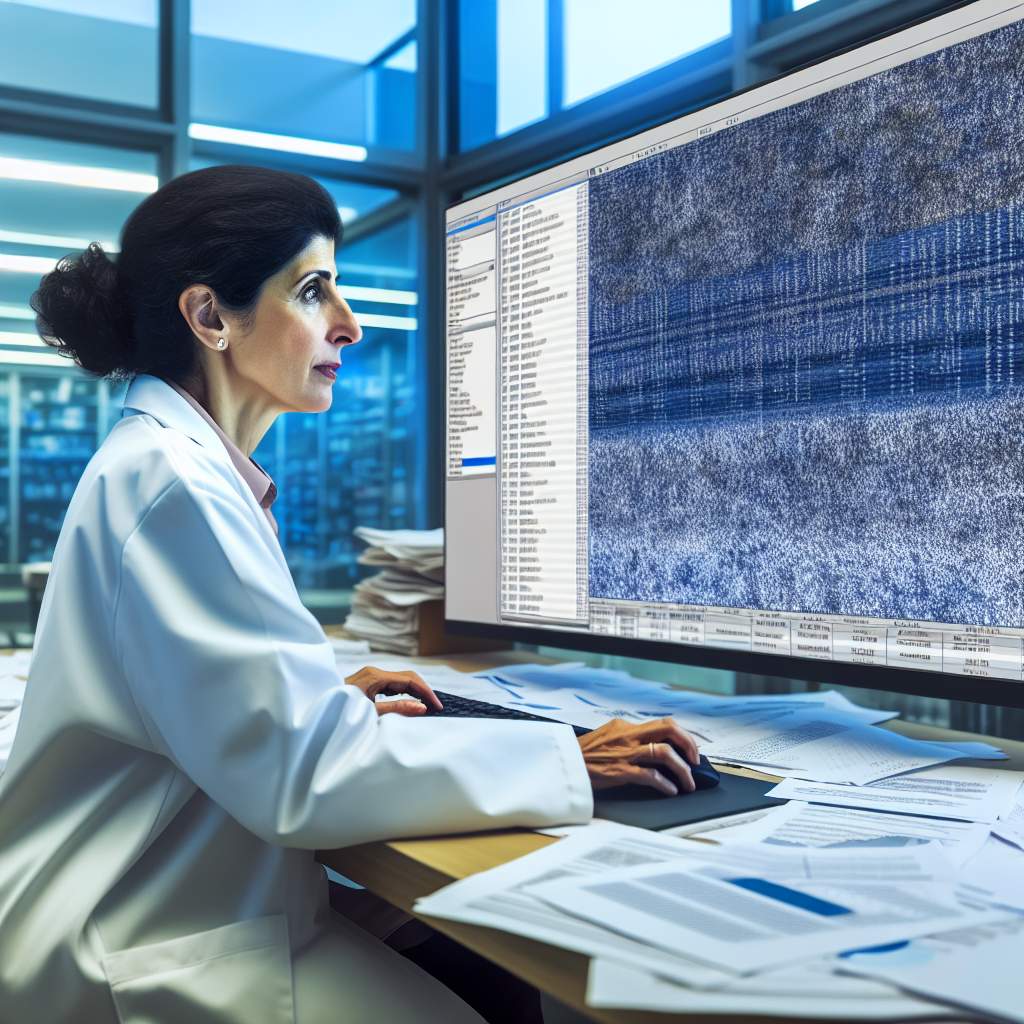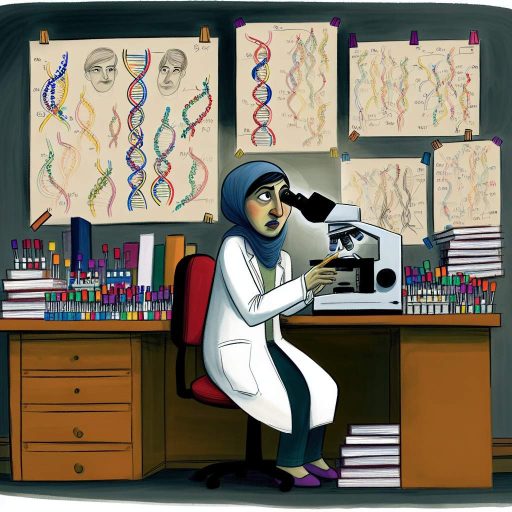Introduction to the Role of an Epidemiologist
The work of an epidemiologist revolves around understanding public health issues.
These professionals analyze patterns of disease in populations.
Each day, they contribute to the prevention and control of diseases.
They collect and analyze data to uncover health trends.
Moreover, epidemiologists collaborate with various stakeholders.
They engage with healthcare providers, government agencies, and community organizations.
Daily Responsibilities
Epidemiologists start their day by reviewing data from multiple sources.
Data might include hospital reports, laboratory results, or demographic information.
They frequently conduct field investigations to identify disease outbreaks.
During these investigations, they interview affected individuals and families.
This process helps them understand the spread of infections.
Data Analysis and Interpretation
After collecting data, epidemiologists analyze it using statistical methods.
They apply software tools to derive meaningful insights from the numbers.
Subsequently, they interpret the analysis to inform public health decisions.
Their findings often guide health policies and intervention strategies.
Communication and Reporting
Communication forms a crucial part of an epidemiologist’s role.
They prepare reports summarizing their findings and recommendations.
Additionally, they present their research to health authorities and the public.
Effective communication ensures that key stakeholders understand the risks.
Furthermore, it aids in mobilizing resources for public health initiatives.
Collaboration and Advocacy
Epidemiologists work alongside diverse teams to tackle health challenges.
They advocate for necessary public health policies to protect communities.
Through collaboration, they help design public health interventions.
Ultimately, their goal is to improve population health outcomes.
Daily Data Collection and Management Tasks
Gathering Data from Various Sources
Epidemiologists start their day by collecting data from multiple sources.
Unlock Your Career Potential
Visualize a clear path to success with our tailored Career Consulting service. Personalized insights in just 1-3 days.
Get StartedThis includes information from hospitals, clinics, and public health agencies.
They often communicate with healthcare providers to obtain the latest statistics.
Additionally, they may gather data from surveys and community outreach programs.
Analyzing Collected Data
After collecting data, epidemiologists begin analysis to identify patterns.
They examine trends and anomalies to understand disease spread.
Using statistical software, they create visual representations of their findings.
This analysis helps in making informed public health decisions.
Maintaining Data Integrity
Data management is crucial for epidemiologists.
They ensure that data is accurate, complete, and reliable.
This involves regularly checking for discrepancies and correcting errors.
Furthermore, they adhere to strict ethical guidelines when handling sensitive information.
Collaborating with Other Professionals
Epidemiologists often work alongside other health professionals.
They collaborate with statisticians, public health officials, and researchers.
These collaborations can enhance the quality of their findings.
Meetings and discussions facilitate the exchange of vital information.
Preparing Reports and Presentations
At the end of the day, epidemiologists document their findings.
They prepare detailed reports that outline their data analysis.
Additionally, they create presentations for stakeholders and the public.
These reports help to inform health policies and community initiatives.
Conducting Field Investigations and Surveillance
Daily Field Work
Epidemiologists begin their days with field investigations.
They assess various health threats in communities.
Each investigation requires meticulous planning and execution.
Often, they collaborate with local health departments.
Datasets guide their work and shape their strategies.
Data Collection Methods
Epidemiologists utilize diverse data collection methods.
Surveys allow them to gather community health information.
Interviews provide qualitative insights into health concerns.
Observational studies enable them to track disease patterns.
Additionally, laboratory results inform their investigations.
Analyzing Health Trends
After gathering data, epidemiologists analyze health trends.
They use statistical software to interpret complex datasets.
This analysis reveals critical information about disease outbreaks.
Moreover, it helps identify at-risk populations.
Ultimately, their findings guide public health responses.
Reporting Findings
Epidemiologists prepare comprehensive reports on their findings.
These reports share insights with health officials and stakeholders.
They emphasize actionable recommendations based on evidence.
Furthermore, they may present findings at conferences.
Collaboration enhances understanding in the public health community.
Surveillance Systems
Maintaining surveillance systems is vital for epidemiologists.
They monitor ongoing health trends and disease outbreaks.
This surveillance necessitates continual data compilation.
They often work with national and international health organizations.
Such systems allow for quick response to emerging threats.
Discover More: Wildlife Biologists’ Impact on Climate Adaptation
Analyzing Trends and Patterns in Health Data
Collecting Data from Various Sources
Epidemiologists start their day by gathering health data from multiple sources.
They utilize hospital records, laboratory reports, and public health databases.
Additionally, they may consult academic journals and government statistics.
Coordinating with healthcare providers enhances data accuracy and comprehensiveness.
Using Statistical Software for Analysis
Next, epidemiologists employ statistical software to analyze the collected data.
They apply various methods such as regression analysis and data modeling.
This process identifies trends and patterns in disease occurrence.
Ultimately, it reveals correlations related to demographics and environmental factors.
Interpreting Results and Drawing Conclusions
After analysis, epidemiologists interpret the results to draw meaningful conclusions.
They evaluate what trends indicate about public health issues.
This interpretation helps in understanding disease spread and prevention strategies.
Furthermore, they communicate findings to stakeholders and policymakers.
Reporting Findings to Inform Public Health Policy
Epidemiologists prepare detailed reports of their findings for various audiences.
These reports often include visualizations such as charts and graphs.
Presenting data clearly assists stakeholders in understanding complex information.
Ultimately, these efforts guide public health policies and interventions.
Collaborating with Other Professionals
Collaboration is key in the field of epidemiology.
Epidemiologists often work alongside doctors, statisticians, and community health workers.
They share insights and strategies to enhance health outcomes.
This collaboration ensures a comprehensive approach to public health challenges.
Learn More: What Aspiring Geneticists Should Know Before Starting Out
Collaborating with Healthcare Professionals and Organizations
Building Strong Partnerships
Epidemiologists actively collaborate with healthcare professionals to enhance public health.
They form essential partnerships with hospitals and clinics to collect vital data.
Additionally, they engage with local health departments to address community health needs.
This collaboration fosters a comprehensive understanding of health issues.
Conducting Collaborative Research
Epidemiologists often conduct joint research projects with healthcare organizations.
This research focuses on disease outbreaks, prevention strategies, and health interventions.
For instance, teaming up with the Center for Disease Control improves data analysis.
Furthermore, collaborative efforts yield more reliable results and actionable insights.
Sharing Knowledge and Expertise
Epidemiologists share their expertise with healthcare systems and organizations.
They provide training on disease surveillance and outbreak investigation techniques.
This knowledge transfer empowers healthcare staff to respond effectively to health crises.
Consequently, sharing knowledge enhances the overall quality of public health responses.
Participating in Community Health Initiatives
Engagement in community health initiatives is vital for epidemiologists.
They work with organizations to promote health education and awareness programs.
These programs aim to inform the public about preventive health measures.
Moreover, outreach efforts build trust and foster community involvement in health initiatives.
Learn More: The Growing Demand for Geneticists in the Biotech Sector
Preparing Reports and Presentations for Stakeholders
Gathering Data
Epidemiologists begin their day by collecting relevant data.
They analyze statistics on disease spread and health outcomes.
Moreover, they evaluate trends over time for informed decision-making.
Data Analysis
Following data collection, they conduct rigorous statistical analyses.
This analysis reveals significant patterns and potential outbreaks.
Additionally, they utilize software tools for effective data visualization.
Drafting Reports
Epidemiologists draft comprehensive reports based on their findings.
They articulate the significance of the data clearly.
Furthermore, they ensure reports are accessible to various stakeholders.
Creating Presentations
In preparation for meetings, they develop engaging presentations.
Visual aids improve understanding among the audience.
By highlighting key data points, they facilitate informed discussions.
Collaborating with Stakeholders
Epidemiologists regularly collaborate with public health officials.
This cooperation ensures alignment on health initiatives.
They also engage with community leaders for broader outreach efforts.
Receiving Feedback
After presenting, they welcome feedback from stakeholders.
This feedback provides insights for improving future reports.
Moreover, it fosters better communication between epidemiologists and the community.
Gain More Insights: How Geneticists Contribute to Solving Global Health Issues

Staying Updated with Current Research and Methods
Engaging with Scientific Literature
Epidemiologists read numerous scientific journals each day.
They focus on articles relevant to their field of study.
This helps them understand ongoing research trends.
Additionally, they examine new methodologies reported by peers.
Regular reading ensures they remain informed about breakthroughs.
Participating in Webinars and Conferences
Epidemiologists attend professional webinars to gain insights.
These sessions often feature leading experts in the field.
Conferences provide networking opportunities with other professionals.
They enable epidemiologists to share their own findings.
Furthermore, attending presentations stimulates new ideas.
Collaborating with Colleagues
Team discussions are essential for sharing knowledge.
Colleagues often suggest interesting studies worth exploring.
Moreover, collaboration promotes diverse perspectives on problems.
Working together enhances project outcomes and innovation.
Utilizing Online Resources
Online databases are invaluable for quick access to information.
Interactive platforms allow real-time discussions among peers.
Many epidemiologists participate in online forums.
These forums facilitate exchange of research insights.
Also, online courses help in acquiring new skills and methods.
Conducting Personal Research
Many epidemiologists dedicate time to their own research projects.
This personal research often contributes to existing knowledge.
Experimentation allows them to test hypotheses and models.
Furthermore, findings may lead to publication in journals.
Every study contributes to advancing the science of epidemiology.
Participating in Public Health Initiatives and Outreach Programs
Collaborating with Community Organizations
Epidemiologists often partner with local organizations.
This collaboration helps address health disparities.
For instance, they may work with non-profits in urban areas.
Such partnerships promote awareness of health issues.
Additionally, they facilitate access to health services.
Developing Educational Campaigns
Epidemiologists design health education campaigns.
These campaigns focus on prevention and wellness.
They utilize data to identify at-risk populations.
Through informational sessions, they share vital information.
Moreover, they develop materials that are easy to understand.
Conducting Workshops and Training Sessions
They often hold workshops for community members.
These sessions teach about disease prevention and management.
Furthermore, they train local healthcare workers.
This training improves response times to health emergencies.
Participants leave with actionable knowledge and skills.
Engaging in Research and Data Collection
Public health initiatives include research projects.
Epidemiologists collect data to assess community health needs.
This information is crucial for developing targeted programs.
Moreover, they analyze trends to improve health policies.
Data-driven decisions can lead to more effective outreach.
Evaluating Program Effectiveness
After initiatives, epidemiologists evaluate outcomes.
They measure the impact of programs on community health.
Feedback helps refine future strategies and initiatives.
Analyzing successes and failures is vital for improvement.
Ultimately, evaluation ensures resources are used effectively.
The Impact of Epidemiologists on Public Health
Role in Disease Prevention
Epidemiologists play a crucial role in disease prevention efforts.
They monitor disease outbreaks to identify causes and trends.
This information helps organizations implement preventive measures.
For instance, they analyze data during flu seasons.
Consequently, they guide vaccination campaigns and public awareness efforts.
Data Collection and Analysis
Daily tasks include collecting various health data.
Epidemiologists collaborate with healthcare providers for accurate information.
They utilize statistical methods for data analysis.
This process identifies high-risk populations effectively.
Moreover, they use the data to shape health policies.
Collaboration with Public Health Officials
Epidemiologists work closely with public health officials.
They provide insights for developing health interventions.
Through teamwork, they ensure that appropriate actions are taken.
Also, they prepare reports for stakeholders and policymakers.
These reports often include recommendations based on findings.
Educational Outreach
Another critical aspect of their work is educational outreach.
Epidemiologists conduct training sessions for health professionals.
They emphasize the importance of data-driven decision-making.
Additionally, they share findings with the public to raise awareness.
Such initiatives foster community engagement in health matters.
Research Contributions
Research is a fundamental part of an epidemiologist’s responsibilities.
They publish studies that contribute to the global understanding of diseases.
These contributions often lead to improved treatment strategies.
Furthermore, they collaborate with universities to drive innovative studies.
This collaboration furthers the field of epidemiology significantly.
Real-World Impacts
The work of epidemiologists has tangible impacts on public health.
They help reduce the prevalence of infectious diseases over time.
Moreover, their insights can mitigate the effects of health crises.
For example, during the COVID-19 pandemic, their expertise was invaluable.
Ultimately, they play an essential role in safeguarding community health.
Additional Resources
Communicating scientific uncertainty in a rapidly evolving situation …




